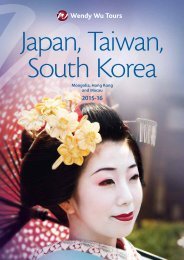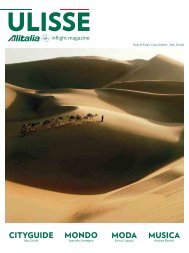Create successful ePaper yourself
Turn your PDF publications into a flip-book with our unique Google optimized e-Paper software.
KNOW INTERVISTA<br />
RICCARDO MUTI<br />
Quando l’arte diventa il senso di una vita.<br />
Maestro Muti, I read somewhere that your relationship to music<br />
wasn’t exactly “love at first sight”. It is true?<br />
You see, my mother was Neapolitan and my father was a doctor<br />
in Molfetta, Puglia. For both, the growth of an individual came<br />
through literature, philosophy and, of course, music education.<br />
In my home, with a tenor for a father and a music-loving grandfather,<br />
music was a necessary step. Not because this should be<br />
the beginning of a career, but simply because of a form of humanism<br />
rooted in Roman and Greek culture. This art form was<br />
considered - rightly - an integral part of an individual’s identity.<br />
Then one day I was given a violin, which initially was more a<br />
curse than a blessing; while my friends were playing football or<br />
biking down in the streets, I was at home, watching them from<br />
the window, with this tool in hand, trying to get sounds out of it.<br />
Hardly love at first sight...<br />
In reality, however, the piano, not the violin, was the instrument<br />
(in every sense) of the first important meeting of your life.<br />
I began studying piano because I could accompany myself. Think<br />
how banal certain decisions are. And then I took a private examination<br />
for the fifth year at the Conservatory in Bari. The director<br />
was Nino Rota, who was working at that time on a new film by<br />
the great Federico Fellini, and so was rarely present at the Condi<br />
Alessandro Manieri - Foto su gentile concessione di riccardomutimusic.com<br />
©Todd Rosenberg<br />
Conosciuto in ogni angolo dei cinque continenti ma ostinatamente<br />
e orgogliosamente rimasto legato alle sue origini.<br />
Incontriamo il Maestro nella sua casa di Ravenna,<br />
città che molti anni or sono ha eletto a suo ‘buen retiro’,<br />
a due passi dalla tomba di Dante e dall’incanto dei mosaici bizantini.<br />
Una vita al servizio dell’arte e della bellezza, che il Maestro<br />
ci racconta nel suo salotto, tra cuscini color écru e memorabilia di<br />
una vita, con l’ospitalità che si riserva di solito agli amici di lunga<br />
data, per una intensa chiacchierata davanti a un caffè sorseggiato<br />
con vellutata lentezza.<br />
Maestro Muti, ho letto da qualche parte che tra lei e la musica<br />
non è stato proprio ‘amore a prima vista’. È vero?<br />
Guardi, mia mamma era napoletana e mio padre un medico pugliese,<br />
di Molfetta, per entrambi, la crescita di un individuo, doveva<br />
passare attraverso la letteratura, la filosofia e ovviamente l’educazione<br />
musicale. La musica in casa mia, con un padre che aveva una<br />
voce da tenore e un nonno melomane, era un passaggio obbligato<br />
e non perché ciò dovesse costituire l’inizio di una carriera, ma<br />
semplicemente perché una certa forma di umanesimo che aveva<br />
le sue radici nella cultura greco romana considerava - giustamente<br />
- questa forma d’arte una parte integrante dell’identità di un individuo.<br />
Quindi un giorno ebbi in dono un violino, che all’inizio fu<br />
più croce che delizia; mentre i miei amici giù in piazza giocavano<br />
a pallone o andavano in bici, io in casa, dalla finestra li guardavo,<br />
con questo strumento in mano, cercando di tirarci fuori dei suoni.<br />
Altro che amore a prima vista...<br />
In realtà però non è il violino bensì il pianoforte lo strumento<br />
(in tutti i sensi) che le fa fare il primo incontro importante della<br />
sua vita.<br />
Cominciai a studiare pianoforte perché così potevo accompagnarmi<br />
da solo, pensi un po’ lei la banalità di certe decisioni. E quindi<br />
mi presentai all’esame come privatista per il quinto anno al Conservatorio<br />
di Bari. Il direttore era Nino Rota, in quel periodo sta-<br />
Art as the meaning of life.<br />
He’s known throughout the world, but is stubbornly and proudly<br />
tied to his origins. We met the Maestro at his home in Ravenna,<br />
a city he chose as his “retreat” many years ago, a few steps from<br />
the tomb of Dante and the enchantment of Byzantine mosaics.<br />
The Maestro tells us about his life in service to art and beauty,<br />
in his living room among ecru cushions and a lifetime of memorabilia.<br />
With the hospitality usually reserved for friends of long<br />
standing, he chatted intensely over a coffee sipped with velvety<br />
deliberation.<br />
64 ULISSE MARZO 2015




